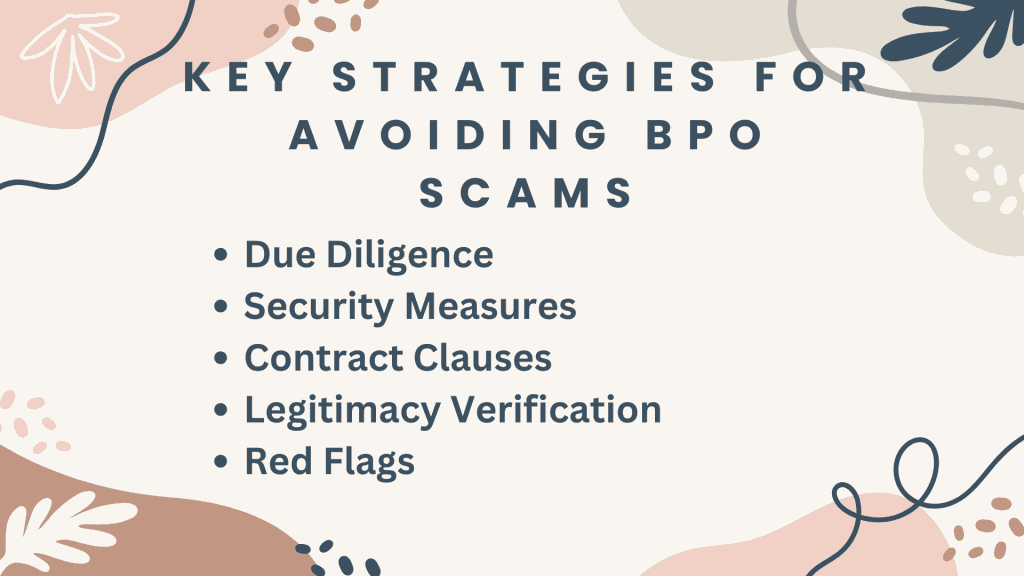The rise in Business Process Outsourcing (BPO) opportunities has been shadowed by the increase in associated scams, making avoiding BPO scams a critical focus for businesses. Vigilance and awareness are paramount in identifying and sidestepping these pitfalls. Key to this is understanding the outsourcing landscape, which involves comprehensive due diligence, robust security measures, and stringent risk management practices. It’s essential to scrutinize contract clauses for transparency and include legitimacy verification steps to ensure operational integrity and financial safety.
Recognizing red flags and adhering to ethical standards can safeguard against fraudulent schemes. Beware of unsolicited job offers, upfront payment demands, lack of company information, and overly high salary promises to avoid BPO scams. Employing BPO vetting processes, focusing on outsourcing fraud prevention, and insisting on BPO transparency requirements are non-negotiable for a secure outsourcing partnership. Always verify BPO legitimacy and operational integrity to protect against BPO cons, ensuring a safe and ethical BPO engagement.
Understanding BPO Scams
In the dynamic realm of Business Process Outsourcing (BPO), discerning the line between legitimate opportunities and deceptive schemes is crucial for safeguarding interests and ensuring operational integrity. Avoiding BPO scams requires a comprehensive approach that encompasses fraud prevention, due diligence, and a keen eye for red flags.
Legitimate BPO vs. Fraudulent Schemes
Legitimate BPO firms are characterized by transparency, ethical standards, and a commitment to delivering value to their clients. These entities operate under stringent security measures and risk management protocols to protect both their and their clients’ interests. On the contrary, BPO scams often lack these foundational elements, instead relying on vague promises and insufficient information to lure unsuspecting businesses.

Key Strategies for Avoiding BPO Scams
- Due Diligence: Thorough vetting of potential BPO partners is non-negotiable. This includes reviewing their track record, client testimonials, and financial stability. A comprehensive BPO due diligence checklist can serve as a valuable tool in this process.
- Security Measures: Ensuring that the BPO has robust security protocols in place is essential for safeguarding sensitive information and financial safety. This includes data protection measures, secure communication channels, and regular security audits.
- Contract Clauses: A clear and detailed contract is a fundamental component of a secure BPO partnership. Key clauses should cover scope of work, confidentiality agreements, and termination conditions, providing a legal safeguard against potential scams.
- Legitimacy Verification: Verifying the legitimacy of a BPO involves multiple facets, including legal status, physical presence, and industry certifications. Tools and resources for legitimacy verification should be employed to confirm the authenticity of the BPO entity.
- Red Flags: Being aware of common red flags can help in avoiding BPO scams. These include unsolicited offers, requests for upfront payments, lack of clear communication, and promises of unrealistic returns.
Red Flags in BPO Scams
| Red Flag | Description |
| Unsolicited Offers | Offers that come without any prior inquiry or interest from your end. |
| Upfront Payments | Requests for payment before any service is rendered or contract is signed. |
| Lack of Communication | Inconsistent or vague communication, often with no direct point of contact. |
| Unrealistic Promises | Guarantees of success or high returns without any risk or effort. |
Operational Integrity and Ethical Standards
Maintaining operational integrity and adhering to ethical standards are paramount in the BPO industry. This not only aids in avoiding BPO scams but also fosters a culture of trust and reliability. Transparency in operations, clear communication, and respect for client confidentiality are key indicators of a trustworthy BPO partner.
Common Types of BPO Scams
In the landscape of modern business, the allure of Business Process Outsourcing (BPO) for efficiency and cost-saving is undeniable. However, the path to outsourcing is fraught with pitfalls, chiefly BPO scams that can undermine the very benefits sought. Avoiding BPO scams requires vigilance, knowledge, and strategic action.
Common Types of BPO Scams
- Payment for Job Offers: A prevalent scam involves fake BPO companies demanding payment for training or securing a job position. Real businesses do not require such fees.
- Data Entry Scams: These scams promise lucrative returns for simple data entry work. Victims pay for registration, only to find the work nonexistent or unrewarded.
- Fake Client Projects: Scammers posing as international clients offer high-paying projects but demand advance fees or access to sensitive company data, leading to financial losses or data breaches.
Avoiding BPO Scams: Key Strategies
- Due Diligence: Rigorous investigation into the BPO’s history, references, and legal standing is crucial. A due diligence checklist can be a valuable tool in verifying a BPO’s authenticity.
- Security Measures: Implementing stringent security protocols and ensuring the BPO adheres to them protects against data and financial theft.
- Risk Management: Developing a comprehensive risk management plan that includes scenario analysis and contingency planning can mitigate potential damages from BPO scams.
- Contract Clauses: Contracts should include clauses that protect against fraud, such as penalties for non-delivery and mechanisms for conflict resolution.
- Legitimacy Verification: Verifying the physical and online presence of the BPO, along with its legal and financial standing, can reveal red flags indicative of scams.
- Financial Safety: Ensuring that financial transactions are secure, traceable, and compliant with international standards safeguards against fraud.
- Transparency and Ethical Standards: Engaging with BPOs that demonstrate a commitment to transparency and high ethical standards is essential for maintaining operational integrity.
Red Flags to Identify BPO Scams
Avoiding BPO scams is paramount in today’s global business environment. As companies increasingly turn to outsourcing to optimize operations and reduce costs, the risk of encountering fraudulent schemes masquerading as legitimate Business Process Outsourcing (BPO) opportunities has risen. To safeguard your business and ensure the integrity of your outsourcing partnerships, it is crucial to be vigilant and informed about the potential red flags that signal BPO scams.
- Upfront Payments: Legitimate BPO firms typically do not require substantial upfront payments before the commencement of services. If a BPO company insists on a large initial payment without a clear justification or a detailed contract, proceed with caution.
- Vague Job Descriptions: Transparency in roles and responsibilities is a hallmark of reputable BPO services. Ambiguous job descriptions or project requirements can be a sign of a scam, designed to lure businesses or individuals under false pretenses.
- Unrealistic Earnings Promises: Be wary of BPO offers that guarantee unusually high returns or wages with minimal effort or investment. These too-good-to-be-true promises often lead to financial losses and wasted resources.
- Lack of Professionalism: Pay attention to the level of professionalism in communications, the quality of the BPO’s website, and their presence in the industry. Scammers often lack professionalism and may have poorly designed websites or use generic email addresses.
- Insufficient Contact Information: Reliable BPO firms provide clear and multiple channels for communication, including physical addresses, phone numbers, and email addresses. A lack of such information is a red flag.
Tips on Scrutinizing BPO Offers:
- Due Diligence: Conduct comprehensive background checks on the BPO firm, including reviews, testimonials, and legal records. A due diligence checklist can be a valuable tool in this process.
- Security Measures: Inquire about the BPO’s security protocols and data protection measures. Legitimate firms adhere to stringent security standards to protect client data.
- Risk Management: Discuss risk management strategies and ensure that the BPO firm has policies in place to handle potential issues and mitigate risks effectively.
- Contract Clauses: Carefully review contract clauses related to termination, dispute resolution, and confidentiality. Clear, fair, and enforceable clauses are indicative of a reputable BPO provider.
- Legitimacy Verification: Verify the authenticity of the BPO firm through third-party agencies or industry associations. This can provide an additional layer of security and peace of mind.
Operational Integrity and Ethical Standards:
Ensuring that your BPO partner upholds high ethical standards and operational integrity is crucial. Transparency in operations, adherence to legal and regulatory requirements, and a commitment to ethical business practices are key indicators of a trustworthy BPO provider.
Verifying Legitimate BPO Opportunities
In the dynamic world of Business Process Outsourcing (BPO), the allure of cost savings and operational efficiency is often marred by the risk of falling prey to scams. Avoiding BPO scams is paramount for businesses seeking to leverage outsourcing for growth and competitive advantage. This guide delves into critical strategies for verifying legitimate BPO opportunities, ensuring your venture into outsourcing is secure, transparent, and aligned with the highest ethical standards.
Verify Business Credentials
Start by conducting thorough due diligence on potential BPO partners. A legitimate BPO company should have a verifiable physical address, a valid business license, and a robust online presence. Check online reviews and testimonials on reputable platforms to gauge their service quality and reliability. Fraud in outsourcing can often be detected by spotting red flags such as lack of transparency, vague contract terms, or unrealistic promises.
Contact Existing Clients and Employees
Reaching out to current clients and employees can provide invaluable insights into the BPO’s operational integrity and ethical standards. This firsthand feedback is crucial in avoiding BPO scams and ensuring the company adheres to industry best practices.
Leverage Professional Networks
Engaging with professional networks and communities related to outsourcing can aid in validating BPO opportunities. These platforms often share scam prevention tips, experiences with various BPO firms, and can help in identifying fake BPOs. Utilizing such networks enhances due diligence and helps in securing outsourcing partnerships that are beneficial and scam-free.
Understand Contract Clauses
Ensure the BPO contract includes clear clauses on risk management, security measures, and fraud prevention. Legitimacy verification should be part of the contract negotiation, with specific attention to financial safety and operational transparency. Contract clauses should clearly define the scope of work, deliverables, and mechanisms for dispute resolution to safeguard against BPO fraud.
Recognize Common Scams
Educating yourself on common BPO scams and how to avoid them is essential. Some typical scams include charging for non-existent services, data theft, and bait-and-switch tactics where services are outsourced to inferior providers. Familiarizing yourself with BPO scam examples and maintaining vigilance can prevent financial and reputational damage.
Implement Security Measures
Adopt comprehensive BPO security measures to protect sensitive data and ensure compliance with legal and regulatory requirements. This includes secure data transmission, robust access controls, and regular audits to ensure the BPO partner maintains high security and privacy standards.
Insist on Transparency and Communication
Transparency in operations and open communication channels are hallmarks of trustworthy BPO partnerships. Regular updates, reports, and meetings should be part of the engagement to ensure alignment and address any issues promptly, thereby avoiding outsourcing pitfalls.
Legal Recourse and Reporting Scams
In the digital age, the rise of Business Process Outsourcing (BPO) has revolutionized how companies operate, offering significant cost savings and efficiency improvements. However, this evolution has also paved the way for avoiding BPO scams to become a critical concern for businesses worldwide. Ensuring the legitimacy of BPO partners through meticulous due diligence, recognizing red flags, and understanding the legal recourse available are paramount in safeguarding your business against outsourcing fraud.
Legal Protections and Fraud Prevention
Countries globally have enacted various laws and regulations to protect businesses from BPO scams. Familiarizing yourself with these legal frameworks equips you with the knowledge to navigate potential pitfalls. For instance, the Federal Trade Commission (FTC) in the United States provides guidance on combating fraud, including BPO scams, by enforcing consumer protection laws.
Reporting BPO Scams
If you suspect you’ve encountered a BPO scam, reporting it promptly to the relevant authorities is crucial. This not only helps in potentially recovering any losses but also aids in preventing the scam from affecting others. Key resources for reporting include:
- Local Law Enforcement: For immediate legal intervention.
- National Fraud & Cyber Crime Reporting Centers: Such as the Internet Crime Complaint Center (IC3) in the U.S.
- Consumer Protection Agencies: Like the FTC in the U.S. or the Consumer Protection Cooperation network in the EU.
Due Diligence and Risk Management
Before engaging with a BPO provider, conducting thorough due diligence is non-negotiable. This involves:
- Background Checks: Verify the company’s legal status, financial stability, and operational history.
- Reference Checks: Speak with past and current clients to gauge the provider’s reliability and performance.
- Site Visits: If possible, visit the BPO’s operational centers to get a firsthand look at their processes and work culture.
Contractual Safeguards
Incorporating specific clauses in your BPO contracts can offer an additional layer of protection against potential scams. These clauses might include:
- Audit Rights: To regularly review the BPO’s compliance with the agreed terms.
- Data Security Measures: Ensure the BPO adheres to stringent data protection standards to safeguard sensitive information.
- Termination Rights: Clearly defined conditions under which the contract can be terminated without incurring significant penalties.
Identifying Red Flags
Being aware of common red flags can help in avoiding BPO scams. These include:
- Unsolicited offers from BPO companies with little to no online presence.
- Requests for upfront payments without clear contractual terms.
- Lack of transparency in operations and reluctance to provide client references.
Operational Integrity and Ethical Standards
Choosing a BPO partner that aligns with your company’s ethical standards and operational integrity is essential. This includes ensuring that the BPO provider adheres to fair labor practices, maintains high levels of transparency in its operations, and commits to ethical business practices.
Conclusion
In the realm of Business Process Outsourcing (BPO), vigilance is paramount to sidestep the pitfalls of scams that can tarnish the benefits of outsourcing. Identifying and avoiding BPO scams requires a keen eye for red flags, a rigorous due diligence process, and an unwavering commitment to security measures and ethical standards.
Key Strategies for Avoiding BPO Scams:
- Due Diligence: Before engaging with a BPO provider, conduct thorough background checks. This includes verifying legitimacy through reviews, testimonials, and regulatory compliance. A comprehensive BPO due diligence checklist can be instrumental in this process.
- Red Flags: Be alert to common red flags such as lack of transparency, unrealistic promises, and evasive responses. BPO scam examples often include requests for upfront payments without clear contractual obligations.
- Contract Clauses: Ensure your contract includes specific clauses for risk management, fraud prevention, and operational integrity. These clauses should outline clear terms for financial safety, data protection, and recourse in the event of a dispute.
- Security Measures: Implement robust BPO security measures, including data encryption, secure communication channels, and regular audits. This safeguards against common BPO scams and ensures outsourced project security.
- Transparency and Ethical Standards: Partner with BPO firms that prioritize transparency and adhere to high ethical standards. This includes open communication, fair labor practices, and a commitment to operational integrity.
- Risk Management: Engage in proactive risk management by setting clear expectations, monitoring performance, and maintaining open lines of communication. This includes being aware of outsourcing fraud trends and incorporating BPO risk management best practices.
- Legitimacy Verification: Utilize tools and resources for verifying BPO legitimacy, such as industry certifications, accreditations, and memberships in professional organizations.
- Community Engagement: Contribute to a safer BPO industry by sharing information on scams and reporting fraudulent activities. Platforms for reporting BPO fraud can be valuable resources for the community.
FAQs
What are common BPO scams to avoid?
Common BPO scams include phishing emails pretending to be from reputable BPO firms, fake job offers requiring payment for training or job placement, and fraudulent companies posing as BPO providers to gain access to sensitive information or funds.
How can I verify the legitimacy of a BPO company?
To verify the legitimacy of a BPO company, research its business history, check for online reviews, verify its physical address and contact information, ask for client references, and ensure it has proper registration and certifications relevant to its industry.
What are the red flags of BPO fraud?
Red flags of BPO fraud include lack of clear communication, no verifiable physical address, unusually low pricing, requests for upfront payments, vague or no contract details, and an absence of client references or testimonials.
How can due diligence prevent BPO scams?
Due diligence can prevent BPO scams by verifying the company’s legal status, financial stability, reputation, operational capacity, compliance with industry standards, and the authenticity of client references, thus ensuring the BPO is legitimate and reliable.
What security measures should be in place with BPO partners?
Security measures with BPO partners should include data encryption, secure VPNs for remote access, regular security audits, compliance with international data protection regulations, employee background checks, and clear protocols for data breach incidents.
Can I recover losses from a BPO scam?
Recovering losses from a BPO scam can be challenging and depends on the jurisdiction, the nature of the scam, and whether the fraudulent entity can be identified and held accountable. Legal action or contacting financial institutions may be possible routes for recovery.
How do BPO scams typically operate?
BPO scams typically operate by impersonating legitimate BPO firms to solicit personal or financial information through phishing, offering non-existent jobs for a fee, or establishing fake BPO services to misappropriate funds or data.
What contract clauses can protect against BPO fraud?
Contract clauses that can protect against BPO fraud include confidentiality and data protection agreements, clear service level agreements (SLAs), penalties for non-compliance, audit rights, and termination clauses for breach of contract or fraudulent activities.
How can I ensure financial safety when outsourcing to BPOs?
To ensure financial safety when outsourcing to BPOs, conduct thorough due diligence, use secure payment methods, establish clear contractual terms including SLAs and penalties for non-compliance, and regularly monitor and audit BPO activities.
How do ethical standards relate to avoiding BPO scams?
Ethical standards relate to avoiding BPO scams by fostering transparency, integrity, and accountability in business practices. Companies adhering to high ethical standards are less likely to engage in fraudulent activities, making them more trustworthy partners.






